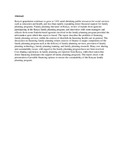| dc.description.abstract | Kenya's population continues to grow at 3.8% amid shrinking public resources for social services such as education and health, and less than rapidly expanding donor financial support for family planning programs. Family planning literature on Kenya, review of reports from agencies participating in the Kenya family planning program, and interviews with some managers and officers from some Nairobi-based agencies involved in the family planning program provided the information upon which this report is based. The report describes the problem of financing family planning services within the context of shortfalls in financing health care in general. The discussion on financing family planning relates sources of finance to major components of the family planning program such as the delivery of family planning services, provision of family planning technology, family planning training, and family planning research. Many cost sharing and sustainability issues with regard to the family planning program have not been resolved. Cost sharing experiences in family planning are reported from Kenya, with observation that donor financing dominates the support of family planning programs. The report closes with presentation of possible financing options to ensure the sustainability of the Kenyan family planning program. | en_US |

